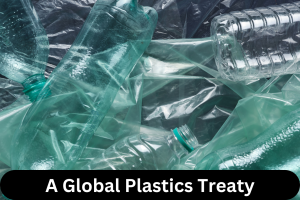ForumIAS announcing GS Foundation Program for UPSC CSE 2025-26 from 27th May. Click Here for more information.
Source-This post on “Urgent Call: A Global Plastics Treaty” has been created based on the article “The planet’s plastic problem: why we need a global plastics treaty” published in “The Indian express” on 29 April 2024.
UPSC Syllabus-GS Paper 3 – Conservation, Environmental Pollution and Degradation, Environmental Impact Assessment.
News– Recently negotiators and observers from 175 countries gathered in Ottawa, Canada, to discuss the world’s first global treaty aimed at reducing plastic pollution. This is the fourth set of talks since 2022 when the UN Environmental Assembly decided to create a binding treaty on plastic pollution by 2024’s end. A Global Plastics Treaty
What may be the provisions of the treaty?
1) The treaty could provide guidelines on how wealthy nations can assist poorer ones in achieving their plastic reduction goals.
2) It could prohibit specific types of plastic, plastic items, and chemical additives, as well as establish legally binding targets for recycling and the use of recycled materials in consumer products.
3) It could include provisions for a smooth transition for waste pickers and workers in developing countries who rely on the plastic industry for their livelihoods.
Why is a legally binding global plastic treaty required?
1) Increase in plastic production– Since the 1950s, global plastic production has increased a lot. It rose from 2 million tonnes in 1950 to over 450 million tonnes in 2019. If left unchecked, it’s set to double by 2050 and triple by 2060.
2) Slow decomposition rate- In a study published by The Lancet in 2023, it was found that nearly 6 billion tonnes of plastic currently pollute the planet. Only a small fraction of plastic has been recycled so far, and because it takes anywhere from 20 to 500 years to decompose, it poses a significant environmental challenge.
3) Impact of Plastic Pollution on Ecosystems and Health– A lot of plastic waste ends up in rivers and oceans, breaking down into tiny particles called microplastics or nano plastics. These particles carry over 16,000 chemicals that can harm ecosystems and living things, including humans. These chemicals disrupt the body’s hormones, leading to issues like cancer, diabetes, and reproductive disorders.
4) A Major Contributor to Climate Change– Plastic production and disposal are adding to climate change. As per OECD report, in 2019, plastics produced 1.8 billion tonnes of greenhouse gas emissions, which is about 3.4% of global emissions. Around 90% of these emissions come from making plastic, which relies on fossil fuels.
Read more- The UN Treaty on Plastic Pollution
What are the challenges before the adoption of a legally binding treaty?
1) Resistance from oil producing countries– Since the first talks in Uruguay in November 2022, oil-producing countries such as Saudi Arabia, Russia, and Iran have resisted putting caps on plastic production. They’re using various delay tactics, like arguing over procedures, to disrupt productive discussions. They have also asked for narrowing the scope of the treaty.
2) Polarizing negotiations– There’s a coalition of about 65 nations, called the “High-Ambition Coalition,” aiming to address plastic production. This coalition, comprising African nations and most of the European Union, aims to eliminate plastic pollution by 2040 whereas certain oil producing countries do not endorse restrictions on plastic production. This leads to a lack of consensus on legally binding treaties.
4) Opposition by Fossil fuel and chemical corporations– The fossil fuel industry, which provides 99% of the materials for plastics, considers plastics crucial. They, along with the chemical industry, resist cutting plastic production, claiming that the problem lies in waste, not plastic itself. These corporations are trying to weaken the treaty and have sent many lobbyists to the Ottawa negotiations.
Question for practice
Highlight the significance of the legally binding global plastic treaty? What are the roadblocks to the treaty?





